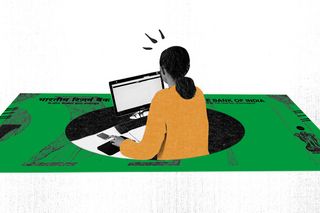
How ‘Headstrong’ Women, ‘Clingy’ Men Face Wage Penalties Due to Gender Stereotypes
A study explains that childhood traits “may lead to some young women being paid less than men for doing a comparable job.”

Being a “headstrong” woman, or a “clingy” man can negatively impact one’s wages at work, according to a new study.
Published by the National Bureau of Economic Research, an American private non-profit research organization, the working paper is based on the analysis of data from the Children of the National Longitudinal Survey of Youth that tracked 10,000 people born in the U.S. in 1979. When the researchers looked into how much the individuals earned between the ages of 24 and 30, they realized women who exhibited “headstrong” behavior as kids, and men who were considered “dependant” had to deal with “large and significant earnings penalties.” However, the reverse — men being “headstrong,” and women being “dependant” — didn’t disadvantage their wages.
“Headstrong” behavior in children was characterized by “argu[ing] too much, hav[ing] a strong temper, [and being] disobedient, stubborn, sullen or irritable. On the other hand, “demand[ing] a lot of attention, cling[ing] to adults, and cry[ing] too much,” was termed as “dependant” behavior.
The scope of the study appears to be limited to the experiences of cis men and women, but its findings are revelatory. The researchers believe gender stereotypes may be at the root of the pay-related disadvantage for “headstrong” women and “clingy” men. For the present set of participants, it couldn’t be attributed to one’s education level, marital status, mental health, self-esteem, or personality traits. “One potential explanation is that these gender differences are a consequence of deviations from gender norms and stereotypes in the workplace,” the study notes.
Related on The Swaddle:
‘Brilliance’ Bias Favoring Men Over Women Affects Gender Parity At Workplaces
The conclusion also speaks to the “assertiveness penalty,” that women pay, which suggests that exhibition of assertiveness by female workers is not appreciated, and deemed “aggressive;” men doing the same, however, doesn’t lead to negative consequences — and may, in fact, be considered in their favor. A 2008 study found that “women who expressed anger were consistently accorded lower status and lower wages, and were seen as less competent,” whereas “men received a boost in their perceived status after expressing anger.”
This presents a double-bind for women at work — to rise in ranks, female workers must break away from their “feminine mold” and display assertiveness; yet, doing so puts them at a disadvantage.
“[S]tudies found that both male and female respondents agreed that successful leaders possess characteristics commonly associated with men — such as leadership ability, competitiveness, self-confidence, objectivity, aggressiveness, forcefulness, ambition, and desire for responsibility. By contrast, women are associated with qualities related to concern for the sympathetic treatment of others. These include being affectionate, helpful, friendly, kind, and sympathetic, as well as interpersonally sensitive, gentle, and soft-spoken,” a study from February last year states.
This is, perhaps, the reason behind the onus of “office housework” — or, administrative and social responsibilities like organizing birthday parties for colleagues, managing food and beverages for office events, or making coffee for co-workers — falling on female workers. “[I]n keeping with deeply held gender stereotypes, we expect men to be ambitious and results-oriented, and women to be nurturing and communal,” an article in The New York Times notes.
Related on The Swaddle:
Study: People Who Believe Workplace Gender Equality Exists Are the Most Biased
Research suggests that if women refuse to pick up after their colleagues, they are not only considered less “likable” by their peers but are also often penalized — through worse performance evaluations or fewer recommendations for promotions. Meanwhile, demonstrating the double standards at play, experts note that if men happen to perform the same chores, their chances of being recommended for promotions, important projects, raises, and bonuses, increase — since it seems “altruistic” of them to help out with something that is considered a natural responsibility of their female colleagues.
The sum total of different biases doesn’t just impact the salaries of individual women but also prevents them from rising to higher positions as often. And as studies have shown, having fewer women in leadership roles impacts overall gender equality in organizations — suggesting that the vicious cycle keeps running unfettered.
Published last year, the World Economic Forum’s Global Gender Gap Report 2021 noted that the pandemic has pushed the wait-time for gender parity by “a whole generation” — from 99.5 years in 2020 to 135.6 years in 2021.
In a world where the odds are already stacked against women being successful at work — especially due to the historically-gendered responsibilities of childcare and domestic labor and women being conditioned to believe they’re not as “brilliant” as men — the present findings paint a grim picture.
Devrupa Rakshit is an Associate Editor at The Swaddle. She is a lawyer by education, a poet by accident, a painter by shaukh, and autistic by birth. You can find her on Instagram @devruparakshit.
Related


New Research Links Poor Sperm Quality to Rising Air Pollution
